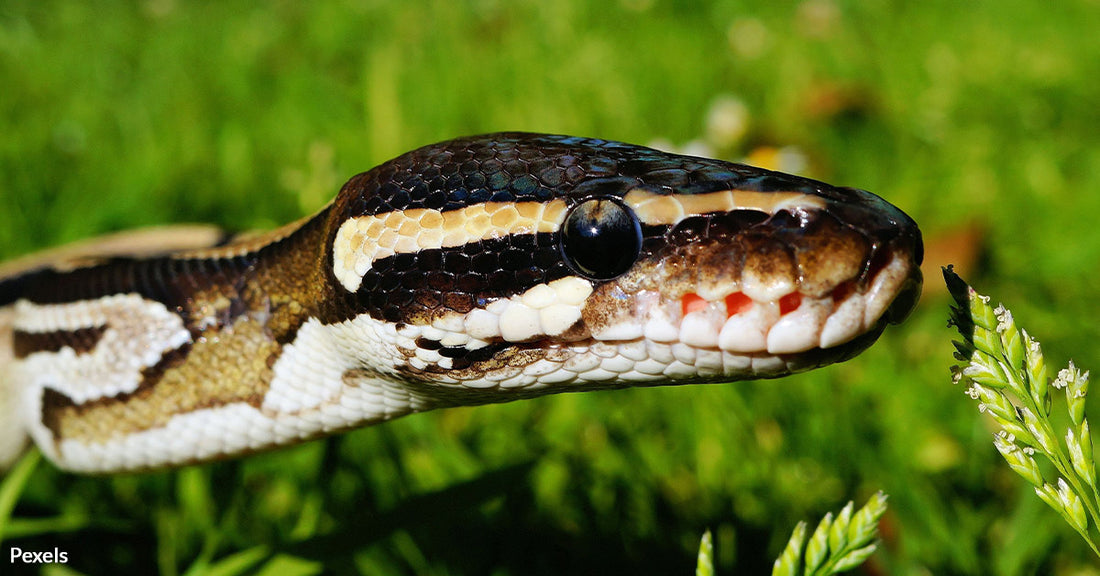Purchase any item in Our Wildlife Collection and we'll send an extra donation! Shop the Collection!
Florida Man Discovers Ball Python During Routine Dog Walk
Matthew Russell
While walking his dogs in South Tampa's Belmar Gardens neighborhood, Dr. David Hernandez experienced an unexpected wildlife encounter. As Yahoo! News reports, he came across a ball python, a non-native species to Florida, lurking in the bushes.
Hernandez, initially surprised by the well-camouflaged reptile, managed to capture video footage of the snake, which measured at least three and a half feet in length.
 Photo: Pexels
Photo: PexelsBall pythons are non-venomous snakes native to sub-Saharan Africa.
Ball Python: A Non-Native Threat
The Florida Fish and Wildlife Conservation Commission (FWC) confirmed the snake as a ball python, a species often kept as pets but non-native to the Tampa Bay area, WTSP reports. This sighting raises concerns about the presence of non-native species in local ecosystems.
Ball pythons, originating from Africa, are ill-equipped to survive the colder temperatures of Florida winters, placing them at risk if not captured soon.
 Photo: Pexels
Photo: PexelsBall pythons are known for their docile nature, making them suitable for beginner snake owners.
Community Reaction and Safety Concerns
Local residents expressed worry for their pets' safety upon learning of the python's presence.
Courtney Cox, whose front yard was the site of the sighting, mentioned concerns for her missing cat and small dog.
Reptile curator Dan Costell from ZooTampa told NewsNationNow that while ball pythons are nonvenomous and generally prey on smaller mammals, their presence in residential areas can be unsettling and potentially dangerous to small pets.
 Photo: Pexels
Photo: PexelsBall pythons require minimal space, making them suitable for indoor pet keeping.
Importance of Reporting Non-Native Species
The FWC has emphasized the significance of reporting non-native species like the ball python and encourages residents to use the FWC’s Invasive Species Reporting Hotline or the IveGot1 app for reporting such sightings. These reports assist in the proper identification and response to invasive species, crucial in maintaining local biodiversity and safety.
https://youtu.be/Hap5goMIlKw?si=tmcqAVUSQdFpUhw8
Ball Pythons in Florida: Escaped Pets?
The FWC website maintains that ball pythons are not a prohibited species in Florida, suggesting that this particular python could be an escaped or intentionally released pet. The agency advises against releasing non-native pets into the wild and offers the Exotic Pet Amnesty Program as an alternative for rehoming such animals. This approach aims to prevent ecological imbalances caused by non-native species while providing humane solutions for pet owners.
 Photo: Pexels
Photo: PexelsIn Florida, escaped or released ball pythons can potentially survive in the wild due to the climate.
Vigilance and Responsibility
Hernandez's encounter with the ball python serves as a crucial reminder of the impacts of non-native species in local environments. Community vigilance and responsible pet ownership are clearly important in preventing the release or escape of exotic animals, and protecting both native wildlife and the community at large.
Prevent incidents like this from occurring in your neighborhood. Click below and take the pledge to prevent stray pets from becoming invasive species.

